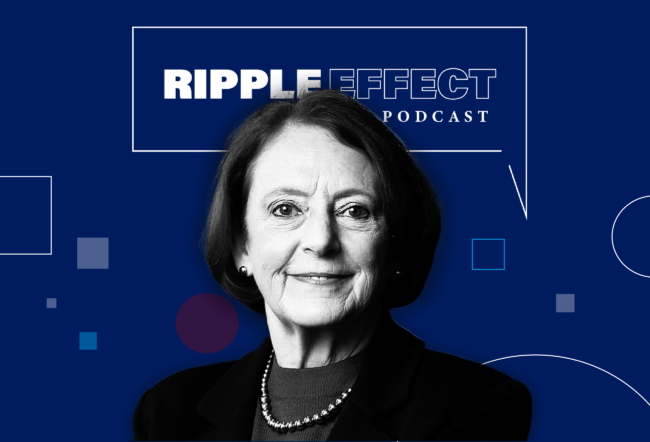For investors, the three-year bear market was a dreadful hangover after the bull-market euphoria of the 1990s. But stocks took off last spring, and 2003 promises to be the first “up” year in the past four for the major indexes. Economic news has been improving. Even the job situation is getting better.
Are happy times here again? Or are serious problems still embedded in the market and economy? “The bear market, I believe, is over,” said Abby Joseph Cohen, chair of the investment policy committee at Goldman, Sachs & Co. “And the period of economic disappointment is also over.”
Speaking as one of the five luncheon keynoters, she recalled that the 9/11 attacks had ruined the improving conditions of the summer of 2001, while corporate scandals soured a promising situation in the spring of 2002. Conditions appeared to be again improving about a year ago, only to be blunted by war worries.
All these non-economic factors are fading in importance now, just as corporate profits are rising smartly, she said. “It doesn’t surprise me that the equity market has recovered.” When the Standard & Poor’s 500 hit its bear-market low of about 800 in the fall of 2002, “investor angst was at extraordinarily high levels,” she added. A year later, investors’ views of stock market risks are at normal levels, and stocks should continue to rise.
John Neff, retired manager of the Vanguard Windsor Fund, agreed. “The economy looks good to me,” he said. Although he does not expect gross domestic product to continue growing at the torrid 7.2% annual rate reported for the third quarter, he thinks it will grow at a healthy 3.5 to 4% in 2004, largely because consumers will continue to spend. “The consumer is still in good shape,” he said, noting they still have plenty of discretionary income despite taking on larger debts in recent years. Tax cuts have helped: “Obviously, the government is priming the pump.”
Though mortgage rates have risen slightly from the 40-year lows of last June, they will stay relatively low by historical standards, he suggested. Meanwhile, the slowdown in corporate capital expenditures is bottoming out, core inflation will probably remain about 2%, productivity is “just remarkable” and wage rates are not going up significantly, he added.
Earnings forecasts suggest the S&P 500 has a forward-looking price-to-earnings ratio of about 17.5, which Neff described as fair value. Hence, if corporate earnings rise, stocks probably will, too.
Bush vs. Dean?
Offering a less optimistic view, James Rogers, co-founder of the Quantum Fund, expects U.S. and European stocks to stay within a narrow trading range for some time. “The days of buy and hold are over,” Rogers said, noting that he is devoting much of his energy these days to short selling U.S. stocks. He suggested investors also should sell U.S. dollars, which he predicted will fall in value, and consider investing in commodities, which have been rising.
Jeremy Siegel, finance professor at Wharton, noted the government had released a “watershed employment report” that morning, showing the economy had added 125,000 jobs in September and 126,000 in October. Employment had declined every month from February through July, and only 35,000 jobs were created in August.
The economy is now performing so strongly it has changed the dynamics of the presidential campaign, he said. Most Wall Streeters believe the markets will react more positively if President Bush is re-elected and Republicans retain control of Congress. “The whole tone of politics is going to change. Bush now has the economy working for him, and very strongly. On the other hand, Iraq is working against him.” He predicted that former Vermont Gov. Howard Dean will win the Democratic nomination and “will give Bush a tough time.”
Siegel noted that the economy and financial markets have benefited from the Bush tax cuts. But most of those are scheduled to automatically expire in 2011. Making them permanent would take new legislation, and that’s far less likely if Democrats gain power. No action is required to let the cuts expire, so a tax increase could take effect by default. “If one of the branches is controlled by the Democrats, or the presidency, the picture will be very different,” Siegel said. “All the tax changes are hanging by a thread.”
Federal Reserve Chairman Alan Greenspan will do all he can to keep interest rates low, Siegel added. But Greenspan cannot be re-nominated when his term expires in 2006, so future Fed policy is uncertain.
Like Rogers, Siegel noted that commodity prices are rising, because of demand from China. That could cause inflation to rise, forcing the Fed to raise rates. “Watch the 10-year (U.S. Treasury) bond,” Siegel said. “If it goes to 5%, Greenspan won’t have any choice but to raise rates.” That bond currently yields around 4.2%, up about a point since June. If the economy and employment continue to grow, a rate hike will come “sooner rather than later.”
Turning to stocks, Siegel said the proprietary “core earnings” model developed by Standard & Poor’s is the best gauge of the price-to-earnings ratio. That model adjusts for factors such as the potential dilution from corporate stock options. Using this gauge, fair market value for the S&P 500 is found when the P/E is around 20. With the index at about 1060 as he spoke, “we are either at fair market value or slightly below fair market value,” Siegel said, which means there’s a good chance stocks will continue rising so long as corporate earnings do. The S&P 500 should continue to return 6 to 7% a year after adjusting for inflation, he added.
According to Martin Fridson, CEO of FridsonVision and an expert in high yield bonds, the stock market is likely to weather the spate of mutual fund scandals. He noted that stocks have performed well during previous scandals.
He was not quite as optimistic about high yield bonds, however. Prices have gone up recently as default rates came down and investors scrambled for bonds amidst a dearth of new issues. High yield bond prices “have gotten a little ahead of themselves.” Though he expects these bonds to return around 10% next year, “I think there’s a risk of a substantial sell-off in the interim.”
The Rise of ETFs?
Asked if anything good will come out of the fund scandals, Rogers said he expects many investors to spurn mutual funds in favor of exchange-traded funds, or ETFs. These are similar to mutual funds but trade like stocks, with prices changing throughout the day. Consequently, they are not subject to the late trading and market timing strategies at the heart of the fund scandals. ETFs also tend to have very low fees. “You will see the mutual fund business decimated,” Rogers predicted.
Siegel said ETFs and low-fee funds, such as index funds, are likely to benefit from the scandals, helping firms like Vanguard Group, which specializes in low fee indexers. “Maybe the real scandal is how much fees have been draining.” Cohen said she expects to see fund companies consolidate.
For Neff, the scandals are a reminder that fund companies must put customers’ interests first. When managing the Windsor fund, he said he never bought a stock for his own account until Windsor was done buying it, and never sold a personal holding until Windsor was finished selling it.
The panelists also were asked how the growing federal deficit will affect the markets and economy. Siegel predicted it would not have much effect so long as interest rates remain low and consumer sentiment is good. Rogers suggested it can do serious damage, arguing that part of the economic gains the country is enjoying currently are due to stimulation from heavy deficit spending that cannot continue. “You give me a trillion dollars, I’ll show you a good time, too,” he said.
Cohen replied that, despite the deficit, “I am very enthusiastic” about prospects for the U.S. economy and financial markets. The U.S., she noted, is doing much better than most other developed countries. Among the reasons: high productivity growth and a notable lack of bank failures during the recession. “The U.S. economy right now really has no competition,” she said.



